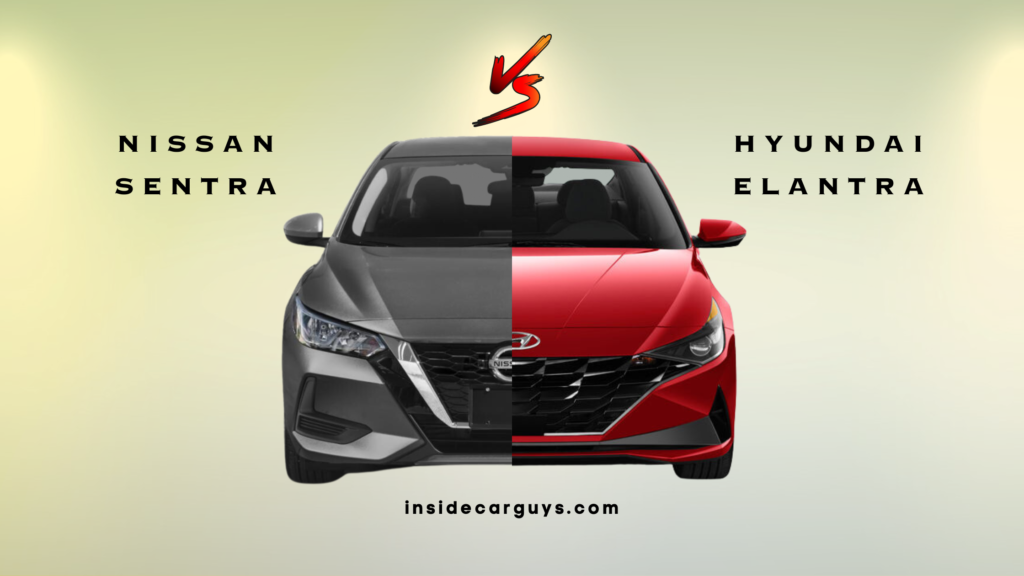Choosing the perfect compact sedan for your needs can be a daunting task, especially with so many great options available in today’s market. Two of the leading contenders in this segment are the 2023 Nissan Sentra and Hyundai Elantra, both offering a blend of style, practicality, and value.
In this detailed comparison, we’ll explore the key aspects of these two vehicles, giving you the information you need to decide which one is the right fit for you.
Exterior Design
The Nissan Sentra has a sleek and modern design that is sure to turn heads. With sharp lines and an aggressive stance, this compact sedan looks both sporty and sophisticated. Its V-Motion grille, LED headlights, and floating roof design give it a distinctive look that sets it apart from the competition.
The Hyundai Elantra has undergone a complete design overhaul, showcasing a more angular and futuristic look. Its eye-catching cascading grille, unique triangular headlight design, and sharp body lines create a bold and dynamic presence on the road. The Elantra’s bold character lines and aerodynamic profile make it stand out in the compact sedan segment.
Interior Design
Step inside the 2023 Nissan Sentra, and you’ll find a well-appointed cabin with high-quality materials and soft-touch surfaces. The dashboard is designed to be driver-focused, with easy-to-reach controls and an intuitive layout. The infotainment system is user-friendly, and the available 8-inch touchscreen adds a touch of modernity to the cabin.
The Hyundai Elantra’s interior is also well-crafted, featuring a futuristic design with a wraparound cockpit feel. Its high-quality materials and attention to detail provide a comfortable and upscale environment. The Elantra’s available 10.25-inch touchscreen infotainment system is not only visually appealing but also user-friendly and responsive.
Seating
The Sentra comfortably seats five passengers, with ample headroom and legroom for both front and rear occupants. Its Zero Gravity seats, inspired by NASA technology, provide excellent support and comfort on long drives. The available heated front seats and a heated steering wheel add an extra touch of luxury.
The Elantra also seats five passengers comfortably, with a roomy cabin and generous legroom in both the front and rear. Its seats are supportive and comfortable, but the Zero Gravity seats in the Sentra have a slight edge in terms of long-distance comfort. The Elantra also offers available heated front seats and a heated steering wheel.
Storage
The Sentra offers a spacious trunk with 14.3 cubic feet of cargo space, which is above average for the compact sedan segment. The 60/40 split-folding rear seats provide additional flexibility for carrying larger items, making the Sentra a practical choice for everyday use.
The Elantra comes out on top in terms of trunk space, offering 14.2 cubic feet. Like the Sentra, the Elantra also features 60/40 split-folding rear seats, providing extra versatility for carrying larger items when needed.
Performance
The Nissan Sentra comes with a 2.0-liter four-cylinder engine that produces 149 horsepower and 146 lb-ft of torque. It is paired with a continuously variable transmission (CVT) that delivers a smooth and efficient driving experience. While the Sentra isn’t the sportiest option in its segment, it offers a comfortable and composed ride.
The Hyundai Elantra is powered by a 2.0-liter four-cylinder engine that generates 147 horsepower and 132 lb-ft of torque. It is mated to a Smartstream Intelligent Variable Transmission (IVT) that provides smooth and responsive performance. The Elantra’s sportier suspension and handling make it a more engaging option for driving enthusiasts, while still offering a comfortable ride.
Fuel Efficiency
The Sentra offers competitive fuel efficiency, with an EPA-estimated 29 mpg city and 39 mpg highway for a combined 33 mpg. This makes it an attractive choice for budget-conscious buyers looking to save on fuel costs.
The Elantra takes the lead in fuel efficiency, with an EPA-estimated 33 mpg city and 43 mpg highway for a combined 37 mpg. This impressive fuel economy makes the Elantra a more economical choice in the long run, especially for those who drive frequently.
Safety
The Nissan Sentra comes standard with an array of advanced safety features as part of the Nissan Safety Shield 360 suite. This includes Automatic Emergency Braking with Pedestrian Detection, Rear Automatic Braking, Lane Departure Warning, High Beam Assist, Blind Spot Warning, and Rear Cross Traffic Alert. The Sentra also offers available ProPILOT Assist, a semi-autonomous driving system that helps with steering, acceleration, and braking.
The Hyundai Elantra also boasts an impressive list of standard safety features, thanks to Hyundai SmartSense. These include Forward Collision-Avoidance Assist with Pedestrian Detection, Lane Keeping Assist, Lane Following Assist, Driver Attention Warning, and High Beam Assist. The Elantra also offers available Adaptive Cruise Control and Highway Driving Assist, which can help make long drives less stressful.
Trim Levels
The Sentra is available in three main trim levels: S, SV, and SR. The base S model comes with a decent array of standard features, while the SV adds more comfort and convenience options. The top-of-the-line SR trim offers sportier styling and additional features for a more premium experience.
The Elantra comes in four main trim levels: SE, SEL, N Line, and Limited. The base SE model offers a good selection of standard features, while the SEL adds more amenities for a comfortable ride. The N Line trim provides a sportier driving experience, and the range-topping Limited trim adds luxury touches and advanced technology.
Pricing
The 2023 Nissan Sentra has a starting MSRP of $19,610 for the base S model, with the SV starting at $20,860, and the SR at $22,410. These prices make the Sentra an affordable option for those seeking a compact sedan with a great balance of features and value.
The 2023 Hyundai Elantra starts at a slightly lower price point, with the base SE model starting at $19,350, the SEL at $20,900, the N Line at $24,100, and the Limited at $25,450. The Elantra’s competitive pricing and excellent fuel efficiency make it an appealing choice for budget-conscious buyers.
Key Differences
Interior Comfort:
The Sentra is equipped with NASA-inspired Zero Gravity seats that provide excellent support and comfort, particularly on long drives. The Elantra’s seats are comfortable and supportive, but the Sentra’s Zero Gravity seats offer a slight edge in terms of overall comfort.
Performance:
The Elantra has a sportier suspension and handling, making it a more engaging option for driving enthusiasts. The Sentra, on the other hand, focuses on delivering a comfortable and composed ride, without prioritizing sporty performance.
Fuel Efficiency:
The Elantra takes the lead in fuel efficiency, with an EPA-estimated 33 mpg city, 43 mpg highway, and 37 mpg combined. The Sentra offers competitive fuel efficiency at 29 mpg city, 39 mpg highway, and 33 mpg combined, but the Elantra comes out on top for those seeking maximum fuel economy.
Trim Levels:
The Sentra is available in three main trim levels (S, SV, and SR), while the Elantra offers four (SE, SEL, N Line, and Limited). This gives Elantra buyers more options to choose from, including the sporty N Line trim for those who prefer a more performance-oriented vehicle.
Pricing:
The Hyundai Elantra has a slightly lower starting price, with the base SE model starting at $19,350, compared to the Sentra’s base S model at $19,610. While the difference in price is not substantial, the Elantra’s lower starting price combined with its superior fuel efficiency may be more appealing to budget-conscious buyers.
Final Thoughts
After examining the 2023 Nissan Sentra and Hyundai Elantra in various categories, it’s clear that both vehicles offer a compelling package to potential buyers. The Sentra stands out with its sleek design and exceptional seating comfort, while the Elantra excels in fuel efficiency and sporty performance.
Ultimately, your choice between these two impressive compact sedans will depend on your personal preferences and priorities. Take the time to test-drive both vehicles and carefully consider the features that matter most to you. By doing so, you’ll be sure to find the car that best meets your needs and provides an enjoyable driving experience for years to come.
Features Breakdown
Nissan Sentra Features
- Exterior Design:
- Sleek and modern design
- V-Motion grille
- LED headlights
- Floating roof design
- Interior Design:
- High-quality materials and soft-touch surfaces
- Driver-focused dashboard
- User-friendly infotainment system
- Available 8-inch touchscreen
- Seating:
- Comfortably seats five passengers
- NASA-inspired Zero Gravity seats
- Ample headroom and legroom
- Available heated front seats and heated steering wheel
- Storage:
- 14.3 cubic feet of trunk space
- 60/40 split-folding rear seats
- Performance:
- 2.0-liter four-cylinder engine with 149 horsepower and 146 lb-ft of torque
- Continuously variable transmission (CVT)
- Comfortable and composed ride
- Fuel Efficiency:
- EPA-estimated 29 mpg city, 39 mpg highway, and 33 mpg combined
- Safety:
- Nissan Safety Shield 360 suite
- ProPILOT Assist available
- Trim Levels:
- S, SV, and SR
- Pricing:
- Base S model starting at $19,610
Hyundai Elantra Features
- Exterior Design:
- Angular and futuristic design
- Cascading grille
- Unique triangular headlights
- Sharp body lines
- Interior Design:
- Futuristic design with wraparound cockpit feel
- High-quality materials
- Available 10.25-inch touchscreen infotainment system
- Seating:
- Comfortably seats five passengers
- Supportive and comfortable seats
- Ample headroom and legroom
- Available heated front seats and heated steering wheel
- Storage:
- 14.2 cubic feet of trunk space
- 60/40 split-folding rear seats
- Performance:
- 2.0-liter four-cylinder engine with 147 horsepower and 132 lb-ft of torque
- Smartstream Intelligent Variable Transmission (IVT)
- Sportier suspension and handling
- Fuel Efficiency:
- EPA-estimated 33 mpg city, 43 mpg highway, and 37 mpg combined
- Safety:
- Hyundai SmartSense suite
- Available Adaptive Cruise Control and Highway Driving Assist
- Trim Levels:
- SE, SEL, N Line, and Limited
- Pricing:
- Base SE model starting at $19,350





